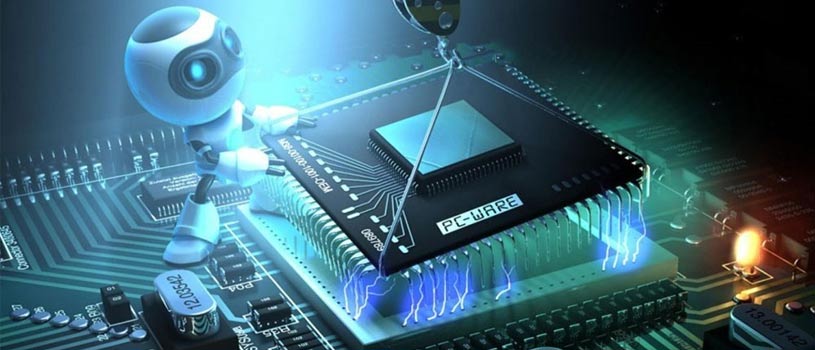
It is quite a new department in the University. Electronics & Communication Engineering is a mixture of electronic devices, circuits, communication equipment like transmitter, receiver, integrated circuits (IC). It also deals with basic electronics, analog and digital transmission & reception of data, voice and video (Example AM, FM, DTH), microprocessors, satellite communication, microwave engineering, antennae and wave progression.
Vision of Department:
To become a pole of excellence in technical education, research and innovation by inculcating knowledge of science, engineering, technology and management for the growth of socially responsible individuals.
Mission of Department:
- To inculcate innovation, design and entrepreneurship amongst the students through outcome based learning.
- To encourage and facilitate faculty, researchers and students to work synergistically across the boundaries of various disciplines.
- To promote research and development, technical consultancy and symbiotic partnership between industry and the Institute.
- To inculcate a high regard for ethical principles and human values and to pursue knowledge as a process of lifelong learning.
Courses: The department offers the following courses
- B.Tech. in Electronics and Communication Engineering.
- M.Tech. in Electronics and Communication Engineering.
- B. Tech. in Electronics Engineering (VLSI Design and Technology).
B.Tech./M.Tech. in Electronics & Communication Engineering
The scope for ECE students is vast and ever-expanding. As the digital age continues to evolve, ECE professionals are in high demand across various industries, including telecommunications, semiconductor manufacturing, information technology, and more. The advent of 5G technology, the Internet of Things (IoT), and artificial intelligence (AI) has only heightened the importance of ECE. In India, in particular, the scope for ECE engineers is significant, with opportunities ranging from research and development to entrepreneurship. The question of what to do after completing engineering in ECE is met with a plethora of exciting answers, including pursuing postgraduate studies, entering the job market, or venturing into entrepreneurial endeavours.
The importance of ECE in our daily lives cannot be overstated. ECE innovations have led to our communication systems, making global connectivity possible, and they drive the development of consumer electronics, medical devices, and autonomous vehicles, among others.
Electronics and Communication Engineering (ECE) offers a vast and diverse job scope, with opportunities in various domains. Here’s a brief overview of the key areas where ECE professionals can excel:
- Analog and Radio Frequency Circuits
- Computer and Digital Systems
- Communication and Signal Processing
- Image Processing and Computer Vision
- Computer Networks
- Remote Sensing
- Control Systems and Robotics
- Microwave & Radar
B.Tech. in Electronics Engineering (VLSI Design and Technology)
The emerging need for digital electronics is making it more significant and causing a continual shift toward digital solutions in all sectors such as electronic instrumentation, control, data manipulation, signals processing, communication, and consumer electronics. VLSI stands for Very Large Scale Integration and is a technology that allows complex digital systems to be miniaturised onto a single integrated circuit (IC). This technology has created highly sophisticated systems that are smaller, faster, and consume less power. VLSI uses a combination of microelectronic circuits, computer-aided design (CAD) tools, and fabrication technologies to create integrated circuits that contain millions or even billions of transistors. This allows extremely complex functions to be integrated into a single IC, resulting in smaller, faster, and more power-efficient systems.
Career Opportunities for VLSI Engineers
As the world has gone digital, the usage of electronic devices has increased. From simple calculators to autonomous vehicles, all the embedded systems deploy microcontrollers and microprocessors. Highly skilled professionals in circuit designing are needed to develop these complex ICs.
There are various fields where VLSI engineers can work, such as:
- Consumer electronics
- Chip Design
- Electronic Design Automation
- Avionics
- Automotive
- Telecommunication
- Biomedical
- Industrial automation
In the fast changing chip design business VLSI specialist are in great demand and the future of the VLSI Industry is encouraging. Texas Instruments, Freescale semiconductor, Cadence, HCL, Intel, Lucent, Mortorola, Philips Semiconductor, Qualcomm, Wipro and TCS are just handful of business that caters to this sector.
Tata Electronics in partnership with PSMC has set up a Rs 91,000 crore mega semiconductor fabrication facility in Dholera in Gujrat. This fab facility will have manufacturing capacity of up to 50,000 wafers per month. India's first semiconductor chip from the Tata Group plant in Dholera will most likely be out by 2026.
Further, in a significant step towards creating an end-to-end semiconductor manufacturing ecosystem in India, Government of India has approved a proposal by Tata Electronics to build a state-of-the-art, greenfield semiconductor assembly and test facility in Jagiroad, Assam. The facility will be built with an investment outlay of INR 27,000 crore and is expected to generate over 27,000 direct and indirect jobs in the region.
Faculty:
The department of ECE has highly qualified and motivated faculties who looks into the overall development of the students and help them experience lifelong learning.